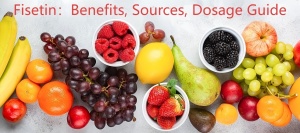Fisetin:Benefits, Sources, Dosage Guide

Fisetin is a naturally occurring flavonoid found in various fruits and vegetables, particularly strawberries, apples, grapes, onions, and cucumbers. In recent years, it has gained considerable attention in the fields of health, nutrition, and longevity research due to its potential anti-aging, anti-inflammatory, and neuroprotective effects. As researchers uncover more about this powerful compound, its applications continue to expand, particularly in supplements and therapeutic formulations.
What Is Fisetin?
Fisetin belongs to the flavonol subgroup of flavonoids and is known for its antioxidant properties. It helps scavenge free radicals, reducing oxidative stress in cells. While fisetin has been studied for decades, it has only recently become a focus in the field of anti-aging because of its potential to eliminate senescent cells — damaged cells that accumulate with age and contribute to chronic inflammation and tissue dysfunction.
Health Benefits of Fisetin
1. Senolytic Activity
One of the most promising benefits of fisetin is its ability to act as a senolytic agent. Senolytics are compounds that selectively target and remove senescent cells, which are linked to age-related diseases. In animal studies, fisetin has shown the ability to extend lifespan and improve health span by clearing these harmful cells.
2. Neuroprotection
Fisetin has been shown to support brain health by protecting neurons from damage, reducing inflammation, and enhancing memory. Studies suggest that it may help delay cognitive decline and reduce the risk of neurodegenerative diseases like Alzheimer’s and Parkinson’s.
3. Anti-inflammatory Properties
Chronic inflammation is a major contributor to many diseases, including heart disease, diabetes, and arthritis. Fisetin helps regulate inflammatory pathways, particularly by downregulating NF-κB and reducing pro-inflammatory cytokines, which can have a protective effect on tissues and organs over time.
4. Antioxidant Support
Oxidative stress damages cells and contributes to aging and disease. Fisetin acts as a powerful antioxidant, neutralizing reactive oxygen species (ROS) and improving cellular resilience. It also enhances the activity of endogenous antioxidant enzymes like glutathione and superoxide dismutase.
5. Metabolic Health
Emerging evidence suggests fisetin may support glucose metabolism and improve insulin sensitivity. It can help regulate blood sugar levels and reduce lipid accumulation, which may be beneficial in managing or preventing metabolic syndrome and type 2 diabetes.
Natural Sources of Fisetin
Fisetin occurs naturally in several plant-based foods. Among the richest sources are:
- Strawberries(SO, How much fisetin in strawberries)
- Apples (especially the skin)
- Grapes
- Onions
- Persimmons
- Cucumbers
However, the concentration of fisetin in these foods is relatively low. To achieve therapeutic benefits, many people turn to fisetin supplements, which provide a concentrated dose.
Supplementation and Dosage
Fisetin supplements are widely available in capsule or powder form. While there is no universally agreed-upon dosage, clinical studies have used doses ranging from 100 mg to 1400 mg per day, depending on the application. As with any supplement, it is important to consult a healthcare provider before beginning fisetin supplementation, especially for those with underlying medical conditions or who are taking medications.
Safety and Side Effects
Fisetin is considered safe when consumed from dietary sources. High-dose supplementation has shown a good safety profile in animal studies and early human trials, but long-term data is still limited. Some users may experience mild side effects such as gastrointestinal discomfort. Careful monitoring is advised when using high-dose fisetin for therapeutic purposes.
Future Research Directions
Ongoing research is exploring fisetin’s role in cancer prevention, cardiovascular protection, skin aging, and immune modulation. Its potential as a non-toxic, plant-derived compound with multiple health benefits makes it a promising subject in aging and chronic disease research. Clinical trials are expanding to validate its effectiveness and safety in diverse populations.
Conclusion
Fisetin is emerging as a valuable natural compound with multiple health-enhancing properties. Its potential to combat aging at the cellular level, protect cognitive function, and reduce inflammation positions it as a promising tool in preventive health strategies. While more research is needed, particularly in human subjects, the current evidence supports its growing reputation in the world of nutritional science and longevity.
